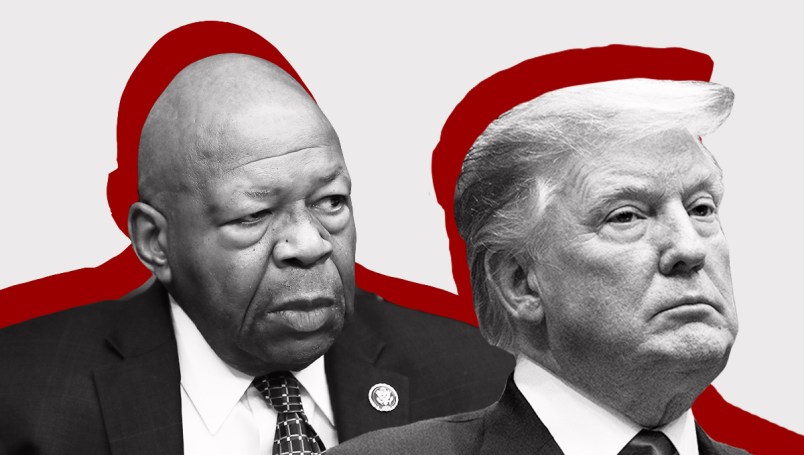When D.C. federal judge Amit Mehta upheld a Congressional subpoena into President Trump’s accounting firm on Monday, he made the first real chip in the wall that Trump has built against Congressional oversight.
Attorneys told TPM that Mehta’s decision constituted a “thorough rebuttal” of the President’s argument — one that provides a framing device for oversight-related cases to come in the Trump era.
Rather than issuing a narrow ruling, Mehta directed his opinion toward the broad, constitutional concerns that Trump’s arguments implicate. He wrote that it’s “simply not fathomable” that Congress can have the ability to impeach without the power to investigate, and contended that an “ambitious legislative agenda” could emerge from House Democrats’ investigations of alleged presidential corruption.
Former federal prosecutor Elie Honig told TPM that the opinion suggested Mehta was interested in part in framing arguments to come.
“Judge Mehta was aware that he was issuing the first ruling in a long series,” Honig said. “I guarantee you that in every subpoena battle that lies ahead, Congress will be citing Judge Mehta’s opinion.”
Mehta also issued his decision quite quickly — the ruling came down just six days after a hearing on the matter — which indicates that the judge perceived Trump’s arguments to be a delay tactic, not just a good faith argument about Congressional authority.
“It suggests that this judge is not going to participate in stall tactics,” former U.S. attorney for the Eastern District of Michigan Barbara McQuade told TPM.
Trump sued his longtime accountant Mazars USA LLP in April to stop it from complying with a subpoena issued by the House Oversight Committee as part of an investigation into the President’s finances.
That probe emerged from allegations made by former Trump attorney Michael Cohen that the President would routinely alter the book value of his assets. The investigation is also examining the President’s compliance with the Emoluments clause and financial disclosure requirements.
In a nearly unprecedented move, Trump hired personal attorneys to sue companies that had received Congressional subpoenas.
Trump is arguing that Congress lacks a legislative purpose to issue the requests, while contending that the subpoenas themselves are too broad and have the potential to expose private information.
McQuade, the former U.S. attorney, told TPM that Trump’s argument that Congress lacked the power to access financial information from a third party struck her as “frivolous.”
“I think [the judge] wanted to reaffirm the notion that Congress is a coequal branch of government,” she added.
Trump’s strategy appears to be aimed at slowing down Congressional investigations so that the release of any meaningful information to the legislature will be delayed as long as possible.
For Mehta, that appears to have directed him towards a quick resolution of the case. The last day for attorneys to submit evidence was Saturday; he issued the ruling on Monday.
“That’s a really important point,” Honig said. “The fact that the judge expedited it over the Trump team’s objections. The Trump team obviously benefits from delay.”
Moreover, the judge rejected a request from Trump to issue a stay pending appeal. (Trump’s attorneys filed a notice of appeal Tuesday morning.)
McQuade attributed this move to an apparent recognition that Trump’s strategy is aimed more at the 2020 elections than a principled stand against Congressional overreach.
“If the Trump administration can delay the resolution enough to get past the 2020 elections,” McQuade told TPM, “they will not have to respond to the congressional subpoenas in a way that is going to matter before the election.”
Mehta peppered his opinion Monday with historical flourishes, opening it with a quotation from President James Buchanan, who refused to comply with an 1860 Congressional investigation.
While higher court judges may hold back from such sweeping historical analogies, Andrew Rudalevige, a professor of Government at Bowdoin College who specializes in relationships between the branches of government, told TPM “it is a message of sorts.”
He added that Buchanan’s argument in the quoted passage suggests that the House gains more investigative authority if it initiates an impeachment inquiry.
“But Congress has plenty of investigative powers short of that,” Rudalevige added, saying that the judge’s opinion dealt more with a broad enumeration of those powers than a specific treatment of the issues Trump raised.







Every single request, every subpoena - every judgement and ruling - will be appealed all the way to the Supreme Court.
Why? Because it buys time - and they believe the fix is in with the Supreme Court.
Take a bow, Amit.
And please get a security guard, bro.
She still has a tight fist on those scales, hope she kicks them in balls and gets back up.
Or what was it…just SING! Shin, instep, nose, groin.